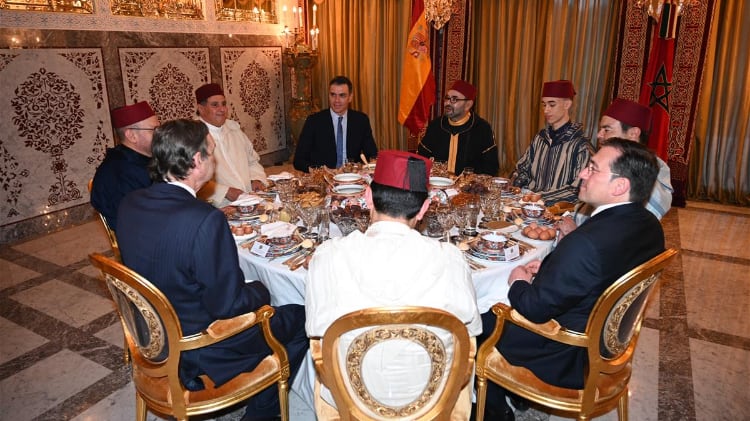Luis Ayllón
The Government is preparing to address its foreign policy objectives in 2024, aware that some of its first tasks will consist of rebuilding some relations that have deteriorated in recent months.
In addition to the intrinsic difficulty in achieving some of the objectives, observers consulted by The Diplomat believe that the discrepancies that have become apparent on some foreign policy issues between the socialist sector of the government and the members of Sumar, or with some of the groups that gave their parliamentary support to Pedro Sánchez to be sworn in as president of the government, should be added to the difficulty of carrying out some of the objectiv
Immediately, the government, whose Foreign Affairs minister, José Manuel Albares, has just formed a new team in his department, has before it the challenge of finishing defining its position with respect to Operation Guardian of Prosperity promoted by the United States in the Red Sea to confront the Houthi rebels.
The conditions that Spain sets to support this operation have caused a clash with Washington, which does not fully understand the position of the Government, whose president is aware that involving our armed forces in this new initiative could cause a rupture in his government coalition and the need to go to the PP and Vox to achieve approval from Parliament.
The controversy over this matter is added to the deterioration of the relationship with Israel, which called its ambassador in Madrid, Rodica Radian-Gordon, for consultations, in protest of Sánchez’s criticism of the response of Benjamin Netanyahu’s Executive in Gaza, after the Hamas attacks, a response that the President of the Government considers not in accordance with humanitarian law.
Rebuilding bilateral relations with Israel is one of the tasks that the Government will have to work on over the coming months and, although the Foreign Ministry considers that it will be possible to do so, it is not an easy objective, while it lasts. the Israeli offensive in the Gaza Strip.
Morocco and Algeria
Another front that the Sánchez Government has before it is trying to rebalance the relationship it maintains with Morocco and Algeria. To this end, a positive step has been taken, which has been the sending by President Abdelmajid Tebboune of a new ambassador to Madrid, nineteen months after having called the previous one for consultations, in protest of the turn taken by Sánchez regarding to Western Sahara.
In addition to political relations with Algiers, the goal is to recover economic relations, which were significantly affected when the breakup occurred and affected many Spanish companies with interests in that country.
In any case, the relationship with Algeria is considered strategic, because it is one of the two great giants of the Maghreb, along with Morocco, and Spain has always been interested in achieving balance and promoting stability in the area. However, given the chronic confrontation between Algiers and Rabat, the objective is easy to achieve.
As for Morocco, the gestures of the Sánchez Government with Mohamed VI, especially its support for the autonomy proposal for Western Sahara, do not bear fruit, nor are many of the issues included in the road map being fulfilled. Both leaders agreed in April 2022. Before, on the contrary, for example, the reopening of the Melilla customs office – closed in 2018 – and the opening of a new one in Ceuta, has not finished taking place. There is still no date for this, despite the recent trip of the Minister Albares, to Rabat.
On the horizon is a future visit by Pedro Sánchez to the Maghreb country, but its completion depends on there being guarantees that he will be received by King Mohamed VI, who did not attend the High Level Meeting in February last year in Rabat.
Gibraltar
In another vein, the Ministry of Foreign Affairs wants the negotiation between the European Commission and the United Kingdom on the future of Gibraltar after Brexit to be resolved soon. Negotiations resumed a few weeks ago, after the formation of the Government in Spain, but they remain stuck on the thorniest issues, which are those related to the joint use of the airport, the presence of Spanish uniformed agents in the port and airport facilities , and everything related to the British naval base on the Rock.
The claim that an agreement could be reached before the end of the year has not been fulfilled and will be one of the issues that will be on the table in the first weeks of the year. Although Spain, formally, does not take part in the negotiations, any movement is consulted, because it will have the last word on what is agreed.
European Union
Still within the framework of the European Union, Spain, which has just left its current Presidency in the hands of Belgium, will foreseeably be present in the community debates, in a semester marked by the preparation of the elections to the European Parliament called for on June 9.
The Government is going to have to dedicate part of its forces to try to convince the authorities and its European partners that the issues related to the amnesty law and its agreements with the Catalan independentists will not violate the separation of powers. Furthermore, in compliance with these agreements, the Executive will insist on trying to get the Twenty-Seven to approve the adoption of Catalan, Basque and Galician as official languages of the Union, an endeavor that will not be easy for it to make a reality.
Spain will maintain its commitment to Ukraine, after the invasion of Russia, both at the bilateral level and at the European level, in this case, especially from an economic point of view.
Ibero-America
On the other hand, the Executive will be very attentive to how things evolve in Ibero-America, where right now attention is focused on the decisions of the new Argentine president, Javier Milei, with whom relations can be complicated. Sánchez, who had clearly opted for the Peronist candidate, Sergio Massa, did not congratulate Milei nor did he send any of his ministers to accompany the King to the new president’s inauguration.
Furthermore, the Government is following the evolution of the situation in Venezuela and the call for presidential elections in the second half of 2024, after Spain has advocated within the European Union for the lifting of sanctions on the regime of Nicolás Maduro.
The Government also wants to strengthen the relationship with the Asian world, particularly with China, a country with which it has celebrated fifty years of bilateral relations. Likewise, the evolution in some African countries will be followed closely and also with concern, especially in the Sahel, where there are Spanish troops and where there is a clear risk of influence from terrorist movements of Islamist origin.







